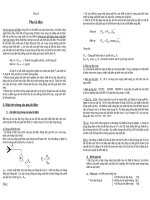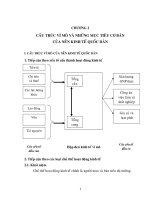Bài giảng môn MARKETING PRINCIPLE LECTURE NOTES: Chapter 2 company and marketing strategy
Bạn đang xem bản rút gọn của tài liệu. Xem và tải ngay bản đầy đủ của tài liệu tại đây (530.52 KB, 7 trang )
9/20/2017
Company and Marketing Strategy
Topic Outline
Chapter Two
Company and Marketing Strategy
Partnering to Build Customer
Relationships
Copyright © 2009 Pearson Education, Inc.
Publishing as Prentice Hall
Chapter 2- slide 1
Companywide Strategic Planning
Strategic Planning
Copyright © 2010 Pearson Education, Inc.
Publishing as Prentice Hall
Chapter 2- slide 2
Companywide Strategic Planning
The strategy must focus on
CUSTOMER
Strategic planning is the process of
developing and maintaining a strategic fit
between the organization’s goals and
capabilities
and
its
marketing opportunities
• Companywide Strategic Planning:
Defining Marketing’s Role
• Designing the Business Portfolio
• Planning Marketing: Partnering to Build
Customer Relationships
• Marketing Strategy and the Marketing
Mix
• Managing the Marketing Effort
changing
Defining
company’s
mission
Setting
objectives
Building
porfolio
Proposing
marketing
plan and
other
functional
strategies
The corporate strategy leads marketing
strategy and marketing plan
Copyright © 2010 Pearson Education, Inc.
Publishing as Prentice Hall
Chapter 2- slide 3
Copyright © 2010 Pearson Education, Inc.
Publishing as Prentice Hall
Chapter 2- slide 4
9/20/2017
1. Defining a Market-Oriented Mission
Companywide Strategic Planning
1. Defining a Market-Oriented Mission
Business field
Customer
• The
mission
statement
is
the
organization’s purpose, what it wants to
accomplish in the larger environment
Offering
value
Core
activities
• Market-oriented mission statement defines
the business in terms of satisfying basic
customer needs
Copyright © 2010 Pearson Education, Inc.
Publishing as Prentice Hall
Chapter 2- slide 5
Companywide Strategic Planning
2. Setting Company Objectives and Goals
Business
objectives
• Build profitable
customer
relationships
• Invest in market
research
• Improve profits
Copyright © 2010 Pearson Education, Inc.
Publishing as Prentice Hall
Marketing
objectives
• Increase
market share
• Create local
partnerships
• Increase
promotion
Chapter 2- slide 7
Copyright © 2010 Pearson Education, Inc.
Publishing as Prentice Hall
Chapter 2- slide 6
Companywide Strategic Planning
Designing the Business Portfolio
The business portfolio is the collection of
businesses and products that make up the
company
Copyright © 2010 Pearson Education, Inc.
Publishing as Prentice Hall
Chapter 2- slide 8
9/20/2017
Companywide Strategic Planning
VINGROUP’S SBU
Analyzing the Current Business Portfolio
Strategic business unit (SBU) is a unit of
the company that :
- Has a separate mission and objectives
that can be planned separately from other
company businesses
- Has a own competitors
- Has a own BODs (Board of Directors) who
proposes strategy and plans
Copyright © 2010 Pearson Education, Inc.
Publishing as Prentice Hall
Chapter 2- slide 9
Companywide Strategic Planning
Copyright © 2010 Pearson Education, Inc.
Publishing as Prentice Hall
Developing Strategies for Growth and Downsizing
Developing Strategies for Growth and
Downsizing
Product/market expansion grid is a
tool for identifying company growth
opportunities through
1.
2.
3.
4.
Market penetration
Market development
Product development
Diversification
Copyright © 2010 Pearson Education, Inc.
Publishing as Prentice Hall
Chapter 2- slide 11
Chapter 2- slide 10
Current
products
Current
market
1. Market
penetration
New market
2. Market
development
Copyright © 2010 Pearson Education, Inc.
Publishing as Prentice Hall
New products
3. Product
development
4. Diversification
Chapter 2- slide 12
9/20/2017
1. Market penetration
Market penetration is a growth strategy increasing sales to
current market segments without changing the product
- Often using promotion and pricing tools
Copyright © 2010 Pearson Education, Inc.
Publishing as Prentice Hall
Chapter 2- slide 13
3. Product development
Product development is a growth strategy that offers new or
modified products to existing market segments
2. Market development
Market development is a growth strategy that identifies and
develops new market segments for current products
- Develop new distribution channels, new markets
Copyright © 2010 Pearson Education, Inc.
Publishing as Prentice Hall
Chapter 2- slide 14
4. Diversification
Diversification is a growth strategy for starting up or acquiring
businesses outside the company’s current products and markets
Acquired
Copyright © 2010 Pearson Education, Inc.
Publishing as Prentice Hall
Chapter 2- slide 15
Copyright © 2010 Pearson Education, Inc.
Publishing as Prentice Hall
Chapter 2- slide 16
9/20/2017
Companywide Strategic Planning
CHIẾN LƯỢC ĐA DẠNG HÓA
Developing Strategies
for Growth and Downsizing
THÂU TÓM
Downsizing is the reduction of the
business portfolio by eliminating products
or business units that are not profitable
or that no longer fit the company’s overall
strategy
Copyright © 2010 Pearson Education, Inc.
Publishing as Prentice Hall
Chapter 2- slide 17
Marketing Strategy and the
Marketing Mix
Customer-Driven Marketing Strategy
Market segmentation is the division of a
market into distinct groups of buyers
who have distinct needs,
characteristics, or behavior, and who
might require separate products or
marketing mixes
Market segment is a group of consumers
who respond in a similar way to a given
set of marketing efforts
Copyright © 2010 Pearson Education, Inc.
Publishing as Prentice Hall
Chapter 2- slide 19
Copyright © 2010 Pearson Education, Inc.
Publishing as Prentice Hall
Chapter 2- slide 18
Marketing Strategy and the
Marketing Mix
Customer-Centered Marketing Strategy
Market targeting is the process of
evaluating each market segment’s
attractiveness and selecting one or
more segments to enter
Copyright © 2010 Pearson Education, Inc.
Publishing as Prentice Hall
Chapter 2- slide 20
9/20/2017
Marketing Strategy and the Marketing
Mix
Marketing Strategy and the Marketing
Mix
Customer-Centered Marketing Strategy
Developing an Integrated Marketing Mix
Market positioning is the arranging for a
product to occupy a clear, distinctive,
and desirable place relative to
competing products in the minds of the
target consumer
Copyright © 2010 Pearson Education, Inc.
Publishing as Prentice Hall
•
•
•
•
•
•
•
Product
Porfolio
Quality
Design
Features
Brand
Label &
Packaging
Service
Chapter 2- slide 21
Marketing mix
Promotion
Advertising
Personal selling
Sales promotion
Public relations
PR
• Direct Marketing
• Digital Marketing
•
•
•
•
Copyright © 2010 Pearson Education, Inc.
Publishing as Prentice Hall
Place
• Distribution
channels
• Market coverage
• Location
• Storage
• Transportation
• Delivery
Target
Customer
MARKETING
MIX
Price
Retail price
Wholesale price
Discount
Deduction
Payment time
and policies
• Debt policies
•
•
•
•
•
Chapter 2- slide 23
Marketing mix is the set of controllable
tactical marketing tools—product, price,
place, and promotion—that the firm
blends to produce the response it wants
in the target market
Copyright © 2010 Pearson Education, Inc.
Publishing as Prentice Hall
Chapter 2- slide 22
Managing the Marketing Effort
Market Planning—Parts of a Marketing Plan
Executive
summary
Marketing situation
Threats and
opportunities
Objective and
issues
SPT
Marketing
mix 4Ps
Action programs
Budgets
Controls
Copyright © 2010 Pearson Education, Inc.
Publishing as Prentice Hall
Chapter 2- slide 24
9/20/2017
Managing the Marketing Effort
Managing the Marketing Effort
Marketing Implementation
Marketing Control
Implementing is the process that turns
marketing plans into marketing actions to
accomplish strategic marketing objectives
Copyright © 2010 Pearson Education, Inc.
Publishing as Prentice Hall
Chapter 2- slide 25
Measuring and Managing
Return on Marketing Investment
Return on Marketing Investment
(Marketing ROI)
Return on marketing investment (marketing
ROI) is the net return from a marketing
investment divided by the costs of the
marketing investment. Marketing ROI
provides a measurement of the profits
generated by investments in marketing
activities.
Copyright © 2010 Pearson Education, Inc.
Publishing as Prentice Hall
Chapter 2- slide 27
• Controlling is the measurement and
evaluation of results and the taking of
corrective action as needed
• Operating control
• Strategic control
Copyright © 2010 Pearson Education, Inc.
Publishing as Prentice Hall
Chapter 2- slide 26









